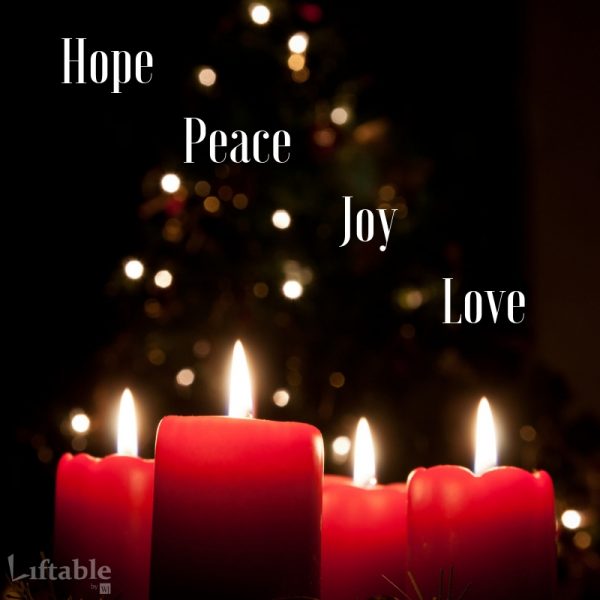
What the Advent Season Really Means to Christians
Too often the hustle and bustle of the Christmas season pushes the “real reason for the season” to the background; we focus on the presents we need to buy and the gatherings we need to attend.
Advent, however, is an invitation to take a pause from the hectic nature of an over-commercialized Christmas and to instead refocus our gaze on a God who loved us so much that he sent His son to dwell among us.
This week, millions of churches across the world lit the first candle on their Advent wreaths. Even if your church doesn’t have an Advent wreath, it is likely that the four weeks leading up to Christmas is spent recognizing Jesus Christ’s divinity and preparing for the celebration of His birth.
Advent became popular in the early church once Christmas was set on a fixed date. Then, much like Lent for Easter, Advent was celebrated in preparation for the Christmas season.
The celebration of Advent became more and more popular as centuries passed and by the fifth and sixth centuries; historical records even began to show evidence of Advent-themed sermons.

What exactly is the purpose of Advent?
The word “advent” is defined by Merriam-Webster as “a coming into being or use.” The church uses this season before Christmas to reflect not only on the coming of Christ as a baby but also on His second coming.
By remembering how those in the Old Testament held onto hope for the coming of the Messiah, we are reminded that while He has already come, He is coming again. And that we hope in the same way that they did.
Jesus told his disciples of his coming return in John 14: 2-3, “… I am going away to prepare a place for you. If I go away and prepare a place for you, I will come back and receive you to Myself, so that where I am you may be also.”
Because of this promise and God’s faithfulness, we can hold onto hope that he will do as he said: He will return to restore the entire world to the way was created to be, including our relationship with him.
Hope, however, holds an element of tension — tension of waiting on things that are yet to come. It is a tension that people in the OId Testament lived in as they waited for the Immanuel’s arrival and it’s a tension that we now live in as we wait for His return.
Advent is a season that we are reminded of this tension.
According to The Bible Project, there are four main themes that are explored during the Advent season to teach us how to live within this tension: hope, peace, joy and love. Each of these themes are represented by a different candle on an Advent wreath that is lit after exploring the theme more closely.

Hope: Expectant Waiting
Hope can be confused with optimism or searching for the positives in a potential sea of negative circumstances, but biblical hope is best defined as expectant waiting for good things yet to come despite unsure circumstances. Today’s Christians can base their hope on God’s past faithfulness which is exactly why Advent is so important. Looking back on the hope maintained in the Old Testament and the fulfillment of those promises can inspire us to hope that God will fulfill his promise to restore the world to the way it was before sin entered into the equation.
“For we know that the whole creation has been groaning together in the pains of childbirth until now. And not only the creation, but we ourselves, who have the firstfruits of the Spirit, groan inwardly as we wait eagerly for adoption as sons, the redemption of our bodies. For in this hope we were saved…” Romans 8: 22-24
Peace: Restoration
Peace can be defined as the tranquil feeling that comes from harmonious environments. Biblical peace, however, defines the restoration of the world to its original state. Once sin entered the world, there was an obvious separation between man and God; it was now stained with conflict. Thanks to Jesus’ sacrifice, however, that relationship can be restored once again. The conflict between us and God can be resolved and all can be restored to its original state. Biblical peace exists where it shouldn’t: in the midst of troubling situations or when the world feels like it is falling apart.
“I have said these things to you, that in me you may have peace. In the world you have tribulation. But take heart; I have overcome the world.” John 16: 33
Joy: Faith + Hope
Joy and happiness are very often confused. Happiness is a fleeting emotion based on circumstances while biblical joy is a choice rooted in foundational truths such as God’s promise for our future, and Jesus’ life and sacrifice. Our joy increases the more we abide in Christ.
“If you keep my commandments you will abide in his love. These things I have spoken to you, that my joy may be in you, and that your joy may be full.” John 15: 10-11
Love: Selflessness
Love is an extremely important theme in the Bible. It is the entire basis for God’s redemptive plan, as is made evident in John 3:16. Jesus even began the two most important commandments with the word “love” in Mark 12. While it’s easy to love those whom we get along with, Jesus elevates the command to love others even more by urging that His followers love their enemies and pray for them. Biblical love is always seeking the wellbeing of others and we are able to do so because of the exuberant amount of love that God Himself has shown us.
“In this the love of God was made manifest among us, that God sent his only Son into the world, so that we might live through him… Beloved, if God so loved us, we also out to love one another.” 1 John 4: 9,11
This Advent season, take a moment to reflect on each of these four themes so that they help you to faithfully and expectantly wait for Jesus’ return, just like the Israelites waited for the Messiah to be born.
Truth and Accuracy
We are committed to truth and accuracy in all of our journalism. Read our editorial standards.
Advertise with The Western Journal and reach millions of highly engaged readers, while supporting our work. Advertise Today.












